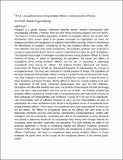Occupational stress among probation officers in central province of Kenya

View/
Date
2012-07Author
Muteshi, Eugene Musoga
Type
ThesisLanguage
enMetadata
Show full item recordAbstract
Probation is a people business, oftentimes requiring intense, stressful confrontations with unmanageable offenders. Presently, there are more felons receiving probation than ever before. The impact of current probation supervision conditions on probation officers has not been fully documented. Since human capital is the greatest investment an organization can make, the ongoing assessment and management of employee stress effects becomes critical to maximizing the effectiveness of probation. Considering the fact that probation officers have contact with more offenders than most other justice practitioners, and probation caseloads have continued to increase at unprecedented levels, there is a need to understand more about the work of probation. The proposed study sought to investigate occupational stress among probation officers in Central Province of Kenya. It aimed at determining the prevalence, the causes and effects of occupational stress among probation officers, and the role of counseling in addressing occupational stress among the officers. The Rational Emotive Behavioral and Person-Environment Fit Theories formed the theoretical framework of understanding the concept of occupational stress. The study was conducted in Central province of Kenya. The population of the study comprised of 98 probation officers serving in Central Province at the time of the study. The study employed convenient sampling of the existing five counties in Central Province to arrive Nyandarua and Nyeri Counties. All the officers in these two counties totaling to 24 were the respondents of this study. Structured questionnaires were used for data collection. Descriptive and inferential statistics were used, and methods of data analysis included percentage score and mean. Data presentation was done by the use of tables. The findings revealed that probation officers experienced normal range of occupational stress with mild levels of stress on Role Ambiguity and Responsibility with combined T-scores of 57.92 and 51.04 respectively. Low remuneration, lack of sufficient resources to carry out job responsibilities and lack of opportunities for career development were found to be significant causes of occupational stress among probation officers. These causes of occupational stress were organizational in nature and not job related. The effects of occupational stress on the officers that were found to be statistically significant (p<0.05) were burnout, demotivation, anxiety/depression, conflict with colleagues, and low productivity. Counseling was cited by the respondents as being functional and pivotal in addressing incidences of occupational stress among them through referrals for counseling, psych education, supervision and debriefing. The study findings are useful to the probation department in Kenya in developing policies and effective Employee Assistance Programs (EAP) and other strategies for prevention and management of stress among probation officers. Furthermore, this study on occupational stress among probation officers in Kenya enlightens the public more on this crucial yet less recognized element of the criminal justice system.
Publisher
KeMU
Subject
Occupation stressDescription
RC 963.48.M8 2014
Collections
- Master of Arts in Counseling [45]
- Thesis [44]
